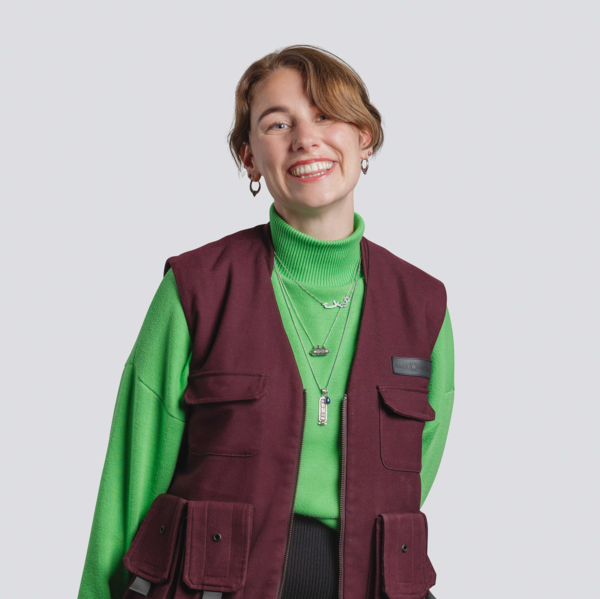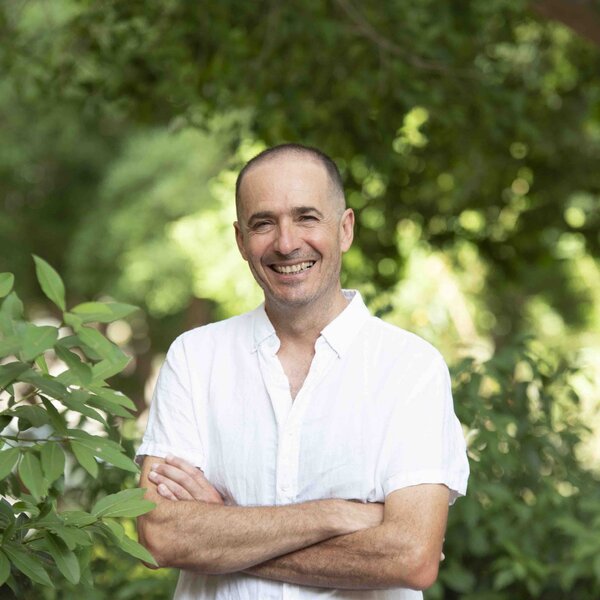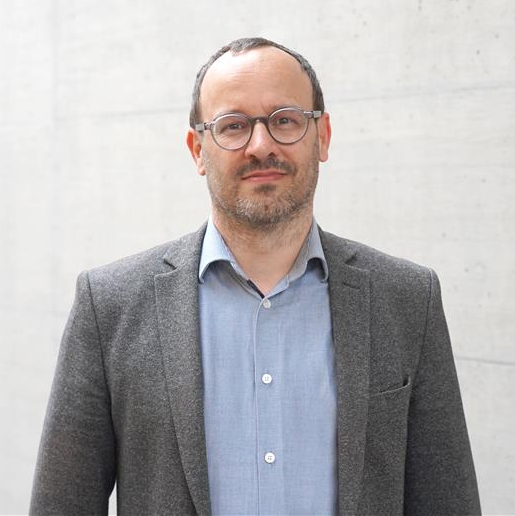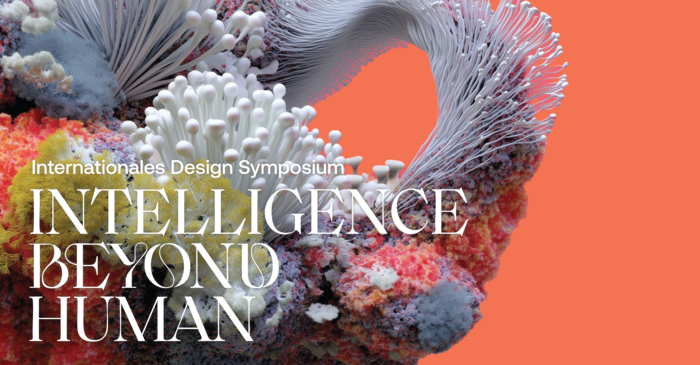Design Symposium
Intelligence Beyond Human
|
Thursday, 30 October 2025 |
|
| When? | 11:00 AM - 10:00 PM |
| Where? | Inatura, FHV Aula (A0 01) |
What can you expect?
The design symposium “Intelligence Beyond Human” explores forms of intelligence that extend beyond the human – from neural networks and swarm behaviour to plant cognition.
At its core, the symposium addresses social, ethical, and design-related questions surrounding artificial intelligence. How is AI changing the way we think, decide, and design?
Through keynotes, workshops, and exhibitions, the symposium opens up an interdisciplinary space between technology, nature, and design – asking how we might act and create intelligently in the future.
Programme
| Venue: inatura - Erlebnis Naturschau Dornbirn (Jahngasse 9)
|
|
| 11:00 - 11:20 AM |
Check-in |
| 11:20 - 11:40 AM |
Welcome |
| 12:00 - 02:00 PM |
Workshop: Plant Intelligence: Plants as Teachers (WS) Workshop: Remixing Your Own, Better Images of Artificial Intelligence (WS) |
| 12:00 - 02:30 PM |
Intelligent Threads: Exploring E-Textiles (WS) |
| 02:00 - 02:45 PM |
KI-Conversations (D) |
| 02:50 - 03:20 PM |
The Dance of the Bees: How Bees Communicate and Collaborate Through Choreography (T, X) |
| 03:25 - 03:55 PM |
Exhibition Tour |
| 04:00 PM |
Division of Labour ? The Collective Intelligence of Ants (X) |
|
Venue: FHV (CAMPUS V, Hochschulstraße 1) |
|
| 04:45 - 05:20 PM |
Check-in & Welcome Drink at FHV |
| 04:45 - 10:00 PM |
Sphagnum Dances and Xenokomposition - Exploring distributed authorship and collaboration with AI (X) |
| 05:15 - 05:35 PM |
From Intelligence to Intelligences: AI through the Lens of More-Than-Human Perspectives (T) |
| 05:40 - 06:00 PM |
Recap Workshop & Answering the Key Questions |
| 06:00 - 06:30 PM |
Can Machines Think? Understanding Human and Artificial Intelligence (T) |
| 06:30 - 07:10 PM |
Planta Sapiens: How Do Plants Think? (T) |
| 07:15 - 07:45 PM |
Networking over Drinks & Snacks |
| 07:45 - 08:15 PM |
Decentering Design - Practice in a More-than-human World (T) |
| 08:15 - 08:45 PM |
A Tour of AIxDESIGN's Critical and Creative AI Practices (T) |
| 08:45 - 09:00 PM |
Break |
| 09:00 - 09:30 PM |
Panel Discussion |
| from 09:30 PM |
Get-together |
Legend
WS = Workshop | T = Talk | D = Discussion | X = Experience
Event language
German & English
Audience
All interested parties are cordially invited to participate.
Participation
Be part of the Design Symposium – Intelligence Beyond Human and get your ticket ▷ here!
Speaker

Nadia Piet, Founder & Creative Director von AIxDESIGN, independent researcher, designer, and organizer
Keynote: A Tour of AIxDESIGN's Critical and Creative AI Practices
Nadia Piet shares insights from AIxDESIGN’s portfolio, including Slow AI, Feminist UX, DIY AI, and more. Her talk showcases how critical design and participatory practices can challenge mainstream AI narratives and open new possibilities for engaging with technology.
Profile: Nadia Piet is the founder of AIxDESIGN, a global community reimagining artificial intelligence through critical and creative practices. She is also a faculty member in the Master’s program Design for Responsible AI at ELISAVA, Barcelona, where she develops new approaches to AI literacy and ethics in design. Her work combines research, teaching, and community projects, opening up space for more inclusive and imaginative technological futures.

Paco Calvo, Professor of Philosophy of Science; Director, Minimal Intelligence Lab (MINT Lab), University of Murcia
Keynote: Planta Sapiens: How Do Plants Think?
What does it mean to call something intelligent, and who gets to decide? In his talk, Paco Calvo challenges our traditional boundaries of intelligence by asking whether meaningful interaction truly ends with nervous systems. Drawing on research in plant cognition, he explores how plants sense, learn, and adapt in ways that resemble agency and decision-making. The talk invites the audience to question deeply ingrained assumptions: Is intelligence tied exclusively to brains and neurons, or is it a broader phenomenon that takes different forms across life? By placing these questions at the heart of his argument, Calvo urges us to rethink intelligence itself—its definitions, its limits, and how expanding them might reshape our ethical relationship with the living world. This perspective is highly relevant for discussions on AI and design, as reimagining intelligence beyond human or animal models can inspire novel approaches to how we build, interact with, and evaluate artificial systems.
Profile: Paco Calvo is internationally recognized for his pioneering research on plant intelligence. At the University of Murcia, he directs the Minimal Intelligence Lab (MINT Lab), where he investigates how plants learn, remember, and make decisions—abilities once thought to belong only to animals. His book Planta Sapiens sparked global debate, challenging how we define cognition and consciousness. Calvo’s work invites us to rethink human–nature relations and expand our view of what intelligence can be.

Giliam Antonie Ganzevles, Designer, Researcher, Author (Brussles, Belgium)
Keynote: Decentering Design - Practice in a More-than-human World
How can we design not just for the world, but with it? Ganzevles introduces more-than-human thinking and presents strategies to shift from human-centered to multispecies design—illustrated with inspiring cases from art and design.
Profile: Giliam Antonie Ganzevles explores how design can move beyond human-centered approaches. As co-author of Decentering Design – Practice in a More-than-Human World, he brings together voices from design, art, science, and policy. His work highlights methods that acknowledge the agency of nonhuman actors and situates design within broader ecological and technological systems. Ganzevles positions design as a practice of responsibility and attunement, opening pathways to more sustainable futures.

Steffen Finck, Head of Circular Lab; Researcher in AI and Data Science, FHV
Keynote: Can Machines Think? Understanding Human and Artificial Intelligence
What does it mean to be intelligent, and can machines claim this trait for themselves? This talk explores the basics of intelligence, the difference between intelligence and autonomy, and whether AI systems can truly “think.” It also examines the connection to creativity, asking where smart pattern recognition ends, where creativity begins, and how much human input AI requires..
Profile: Steffen Finck leads the Circular Lab at the Vorarlberg University of Applied Sciences, where he connects artificial intelligence, data science, and sustainable design. His research focuses on models that support ecological and social transformation, rooted in circular economy principles. By linking machine learning with design practice, he tackles real-world challenges from resource efficiency to resilience. At the Circular Lab, he brings together designers, engineers, and scientists to explore how AI can responsibly contribute to sustainable futures.
